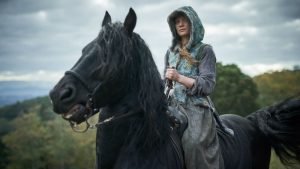QUICK SNAP: LIVE FROM TALLINN
A young Mother (Rosie Day) lives in a shabby studio flat in a big city. Her apartment resembles a drug den: the sink overflowing with unwashed dishes, the tables covered with empty bottles and tins, insects crawling on the floor. That’s thanks to Mother’s addiction to heroin. Not quite a salubrious environment for a newborn baby, brought into the world on the same table as the drugs are kept.
The fact that the lead actress is British makes absolutely no difference to this Spanish movie, since it’s entirely devoid of dialogue. This very peculiar storytelling device, which renders the film strangely charming and quaint.
Mother sells her child to a Lesbian couple living in a very large house on the mountains in order to pay for her addiction. In reality, these two females are part of a bigger child trafficking ring made up of older women with outlandish costumes. Their dwelling is equally bizarre, cluttered with old-fashioned larders and creepy dolls. Rotting fruit, insects and dirt on nearly every surface. Think Delicatessen (Jean-Pierre Jeunet/ Marc Caro, 1991) covered with cobwebs and mould. In a way, not dissimilar to Mother’s very own flat back in town. The couple have a child of their own: a limping girl around eight years of age with a sadistic smile and a quirky taste for clothes.
What follows is the never-ending battle between junkie-turned-saviour versus evil lesbians and their child from hell. Mother enters the house and tries to rescue her baby from a wicker crib placed in the middle of the lounge. While effective in the first half, Baby gets repetitive after the Mother attempts to snatch the child for 15th time, the story going around in circles virtually unchanged. The narrative arc is just too flat.
This very unusual Spanish movie makes extensive use of fantasy film aesthetics. The costumes are outrageous, the facial expressions exaggerated and the conversations non-existing (replaced by copious panting, gasping, crying and wailing). There are real animals everywhere: horses, eagles, spiders, beetles and mice. All of them them bright-coloured and enchanting, cloaked in mystery. Dense woods and verdant hills add the final touch to his exquisite fairy tale. The eerie soundtrack blends indie rock with old-fashioned French chanson. Yet this is not a children’s movie because the drug-taking and the violence are very graphic. A young mother injecting heroin on her foot definitely isn’t suitable for your five-year-old.
All in all, Baby is dirty little movie worth a viewing.
Baby has just premiered at the 24 Tallinn Black Nights Film Festivals as part of the event’s Official Competition.











